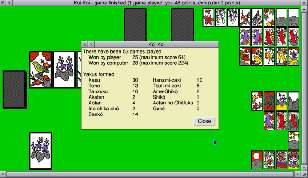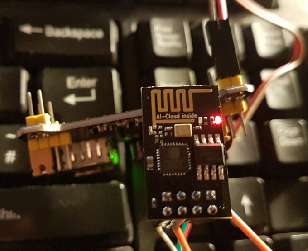Rick's b.log - 2018/11/10
You are 3.144.47.115, pleased to meet you!
Rick's b.log - 2018/11/10 |
|
| It is the 21st of November 2024 You are 3.144.47.115, pleased to meet you! |
|
mailto: blog -at- heyrick -dot- eu
They might have banned it from being shown on TV. That doesn't mean we can't share it online. It's the 21st century, "banning" a message isn't going to make it magically go away. Enjoy Rang-tan's story:
The game look and feel has been tidied up too. Gone is the fugly VDU text, replaced by the Desktop font. Also the cards in the capture area are now arranged by type rather than all jumbled together. The player can optionally have their hand auto-sorted after the cards are dealt (highest value cards to the right).
Get your copy:
Easy. Look on Amazon.
Here's the official NHL licenced product for Playmobil in Canada and Northern America:
As if it wasn't obvious from the picture, "NHL" means "National Hockey League" ("Ligue nationale de hockey" dans le zone francophone) for ice hockey, comprising of 24 teams in the US and 7 in Canada. Despite the greater number of American teams, the NHL was born in Canada; though the American influence is perhaps why the NHL is headquartered in New York, having left Montréal in 1989.
Sent to me from Canada, Amazon outdid themselves in crazy. Do you see the box looks a little tatty, and there is some colouring missing from the upper left (by the NHL badge)? And maybe the eagle-eyed can spot similar on the upper right? That's because Amazon stuck address and tracking labels on the box and sent it like that! You know, this being the company that puts a small calendar into an enormous box. Well, okay, so now postal employees on two continents know I'm going to be enjoying an NHL Playmobil calendar this year! Coucou, salut!
So, this will be the Playmo advent calendar for 2018.
What I have is a USB to serial interface based upon a (clone) PL2302. The serial port provides Tx, Rx, Gnd, and +5V.
The ESP8266 module is a tiny device that provides a serial interface and talks to WiFi networks. It supports 802.11 b/g/n with a built-in TCP/IP protocol stack, with low power behaviour (the rated maximum consumption is 215mA). It doesn't offer a socket level stack, it is connection based (connect to this IP address on this port).
It's pretty simple to use the device by typing commands directly into HyperTerm (I was using Windows) or any other terminal that can talk to the USB serial port, however there are some caveats to be aware of:
From now on, bold white will be things you type, and grey will be the response. The first step is to reset the device:
Now check the firmware version:
We should probably see if there's a firmware update, but first we need to get it onto a network, so let's do that. The first command switches to AP & client mode. You need to have client mode active in order to scan for other access points.
Here, the parameters returned are 3 for WPA2_PSK, the SSID of the Access Point, -70 for signal strength, the MAC address. There appears to be other information (in this case, "6,-9,0") that doesn't appear to be documented. I am guessing 6 is the WiFi channel. No idea about the others.
Now let's try to connect. We'll set up the AP's password and we can see the device try to join the AP.
So now disconnect from the access point, and reconnect again this time writing the configuration to onboard Flash.
Did you spot the difference? The CWJAP command was followed by "_DEF" to mean "use this as the default from now on". What this means is that when the device is set into client mode (with or without its own AP), it will automatically try to connect to that access point.
So now we're online, let's see if there's an update... There are four stages to the update (1 - connect to server, 2 - request update, 3 - get update, 4 - flash update), it will take a short time so be patient, and the device will likely reset afterwards. You can then enquire the firmware versions to see what's changed.
As you can see, the AT and SDK are the same, but the Ai-Thinker part has been updated.
Now to fetch something. You cannot use domain names as there is no onboard DNS, so you must pass IP addresses. I'm going to connect to my Pi as it will likely be a more forgiving server...
There is a way to enter 'interactive' mode where what you type is sent directly to the remote machine, and its replies come back directly (not via
Clearly this device is best talked to by software, not a ham fisted human beating on the keyboard like a chimpanzee. However, for a few minutes playing with the device, it looks like an interesting way of adding basic WiFi capabilities to a device that doesn't have them. The ESP8266 also has modes to handle multiple concurrent connections, and also some sort of server mode. It can also act as an access point by itself.
First, this...
Apparently banned for being, and I quote "too political", this Christmas advert by Iceland (a frozen food chain in the UK) tells the story of the destruction of the forests in the process of cultivating palm oil. Over here in France, it's a hot topic too, with more and more products advertising that they are free from palm oil.
I'm not sure what exactly the political aspect is here, other than very likely to be big business that uses palm oil in many products leaning on politicians to lean on the independent advertising reviewer (it was a company called "Clearview", not the official advertising watchdog).
While I don't think there are many (any?) companies with an ethically clean record when it comes to environmental issues (for instance, think of the environmental impact of all those freezers that Iceland operate, not to mention the energy keeping food frozen), the destruction of natural habitats is a real thing and some products are horrific offenders in this respect. We might grumble at the amount of maize being grown in Europe for bio-fuel additives, but we should probably start thinking about the impact that other food additives are having on the environment. Because we can't see it doesn't mean it isn't happening, and because it is happening on the other side of the planet doesn't mean it does not matter. We have to start somewhere. And the place to begin is awareness.
Koi-Koi
Since the last release here, I have enhanced the program quite a bit more - specifically the computer player is more complex and has three levels of difficulty:

This software is for RISC OS!Advent calendar
Well, the calendars this year were something like "Santa on the farm" (had that one in 2016), "Horses and stuff" (had that one last year), and "bank robbers" (not interested). So what to do?

ESP8266
I purchased an ESP8266 serial to WiFi module ages ago. I think it cost about a fiver. More recently, I got myself a set of 20 (or so, not counted) female-to-female jumpers. Being sent from China for a price something silly like €0,79 including postage, it accordingly took forever to arrive. But eventually it did.

The +5V rom the USB cable is connected to a YuRobot power board to drop the 5V to 3.3V for the ESP8266. This power board is fairly dangerous as it has tiny voltage regulators with no heatsinks that have a tendency to fail unsafe (providing the source voltage to the output). However the ESP8266 is not that power hungry so I decided to risk it.
When everything is hooked up, turned on, and such, enter the command:
AT
You should see the reply:
OK
If you do not, then enter some random gibberish while looking at the ESP board. Does the little blue LED flash briefly as you press keys? If it does not then your wiring is not correct. You are pulling the chip select pin high? Is the red LED on? It should be...
If the blue LED is blinking, then there's something wrong with your configuration. Verify that the comms program is sending CRLF and not just LF when you press Enter. You may see a blank line after everything you type. If this is correct, then try connecting at 57600bps, and at 9600bps. You can alter the serial speed, and if you got yours second hand or aimed at Arduino boards, the serial rate might have been slowed so as not to swamp the microcontroller (there's no flow control, remember).
AT+RST
OK
ets Jan 8 2013,rst cause:2, boot mode:(3,7)
load 0x40100000, len 1856, room 16
tail 0
chksum 0x63
load 0x3ffe8000, len 776, room 8
tail 0
chksum 0x02
load 0x3ffe8310, len 552, room 8
tail 0
chksum 0x79
csum 0x79
2nd boot version : 1.5
SPI Speed : 40MHz
SPI Mode : DIO
SPI Flash Size & Map: 8Mbit(512KB+512KB)
jump to run user1 @ 1000
OK
AT+GMR
AT version:1.2.0.0(Jul 1 2016 20:04:45)
SDK version:1.5.4.1(39cb9a32)
Ai-Thinker Technology Co. Ltd.
Dec 2 2016 14:21:16
OK
AT+CWMODE=3
OK
AT+CWLAP
+CWLAP:(3,"Livebox-XXXX",-70,"d0:ae:00:00:00:00",6,-9,0)
OK
AT+CWJAP="Livebox-XXXX","12345678901234567890123456"
WIFI CONNECTED
WIFI GOT IP
OK
Now let's verify this:
AT+CWJAP?
+CWJAP:"Livebox-XXXX","d0:ae:00:00:00:00",6,-85
OK
This shows us we're connected to the AP, its MAC address, channel, and signal strength.
AT+CWQAP
OK
WIFI DISCONNECT
AT+CWJAP_DEF="Livebox-XXXX","12345678901234567890123456"
WIFI CONNECTED
WIFI GOT IP
OK
AT+CIUPDATE
+CIPUPDATE:1
+CIPUPDATE:2
+CIPUPDATE:3
+CIPUPDATE:4
2nd boot version : 1.5
SPI Speed : 40MHz
SPI Mode : DIO
SPI Flash Size & Map: 8Mbit(512KB+512KB)
jump to run user2 @ 81000
Ai-Thinker Technology Co. Ltd.
ready
WIFI CONNECTED
WIFI GOT IP
AT+GMR
AT version:1.2.0.0(Jul 1 2016 20:04:45)
SDK version:1.5.4.1(39cb9a32)
Ai-Thinker Technology Co. Ltd.
v1.5.4.1-a Nov 30 2017 15:54:51
OK
AT+CIPSTART="TCP","192.168.1.10",80
CONNECT
OK
AT+CIPSEND=18
OK
>
At this point, you will type in GET / HTTP/1.0 and press Enter. What you type is not echoed.
Recv 18 bytes
SEND OK
+IPD,17:HTTP/1.0 200 OK
+IPD,1460:Content-Length: 6059
Content-Type: text/html
Date: Sat, 10 Nov 2018 18:49:52
X-Server-Info: WebJames on RISC OS on a RaspberryPi.
Server: WebJames/0.48
There will follow a number of lines beginning with +IPD,xxx: where xxx is the number of bytes that follow. This will continue until there is no more data, and you'll see CLOSED instead of the +IPD message.
+IPD prefixed lines). This may be useful for interactive protocols such as telnet, however I couldn't get the breakout command ('+++') to work. I ended up power-cycling the device. If you want to try it, the command is AT+CIPSEND (with no size specified).
David Pilling, 24th November 2018, 02:09
The 8266 is very nice, but the company behind it has let the "community" work it out for themselves. There is not the nice documentation that comes with things like the ATMel AVR chips. By now it is quite reasonable but it was harder going a few years back (came out around 4 years ago).David Pilling, 24th November 2018, 02:12
(and in the first comment I meant to say "twin core")Jonathan Harston, 2nd December 2018, 09:51
Oh you can't use margarine, that's full of evil trans fats!
Ok, just use non-trans-fat margarine.
Oh, you can't do that, it's full of evil palm oil!
Dilemma dilemma....
| © 2018 Rick Murray |
This web page is licenced for your personal, private, non-commercial use only. No automated processing by advertising systems is permitted. RIPA notice: No consent is given for interception of page transmission. |